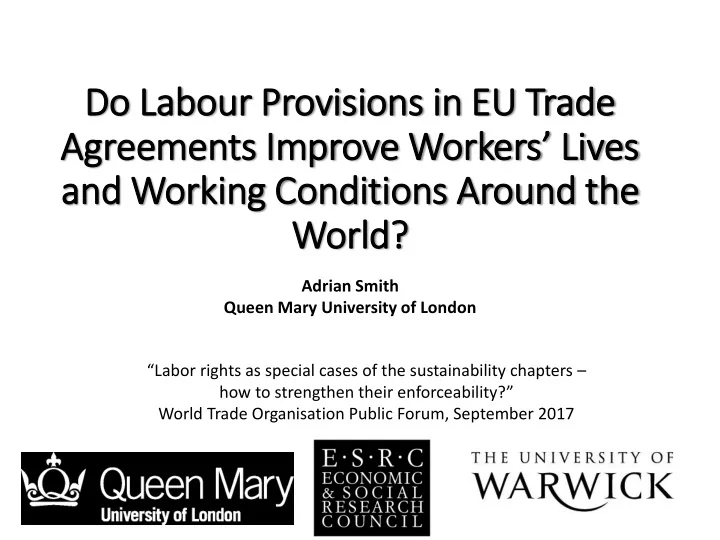

Do Labour Provisions in in EU Trade Agreements Improve Workers’ Lives and Working Conditions Around the World? Adrian Smith Queen Mary University of London “ Labor rights as special cases of the sustainability chapters – how to strengthen their enforceability ?” World Trade Organisation Public Forum, September 2017
The “Working Beyond the Border: European Unio ion Trade Agreements and In International Labour Standards” Research Proje ject • Funded by UK Economic and Social Research Council: September 2015 – December 2017 • Interdisciplinary project team: Mirela Barbu, Liam Campling, James Harrison, Ben Richardson and Adrian Smith • Labour Provisions in EU Trade & Sustainable Development Chapters
Research Desig ign and Methodology • Three country/FTA case studies • South Korea (FTA 2011) • CARIFORUM/Guyana (Economic Partnership Agreement 2008) • Moldova (DCFTA/Association Agreement 2014) • Sectoral/value chain focus in major export sectors • Automotives (South Korea) • Sugar (Guyana) • Clothing (Moldova) • Contrastive case studies involving just under 200 key informant interviews and focus groups
Summary Research Fin indings • Civil society mechanisms hampered by a range of operational failings: resourcing, lack of meetings, difficulties with representation in trading partners, insufficient substantive discussions, lack of awareness and information-sharing, lack of independence from government • Monitoring and assessment of ‘sustainability’ impacts has not been properly operationalised: relevant provisions are lacking specificity (open to interpretation); little evidence that vigorous monitoring has been conducted; no appropriate mechanism is in place to ensure that negative effects of the FTA on labour standards are adequately remedied • Dispute resolution process is insufficient. TSD chapters are exempt from the general dispute settlement mechanism of EU FTAs. Panels of experts process has not been utilised and lacks a credible enforcement mechanism • Working conditions are impacted by a range of factors including the forms of global value chain integration in the dominant export sectors in each country, and specific political contexts (e.g. “lead firm” contracting pressures and poverty pay in Moldovan clothing sector). Limited reach of ILO core labour standards to address real labour issues • Diversity of sectoral and country experiences illustrates the limits of a “one size fits all” approach to labour provisions in trade agreements in dealing with labour conditions in global value chains
Thank you! • To find out more about our research: http://www.geog.qmul.ac.uk/research/beyondtheborder/
Recommend
More recommend